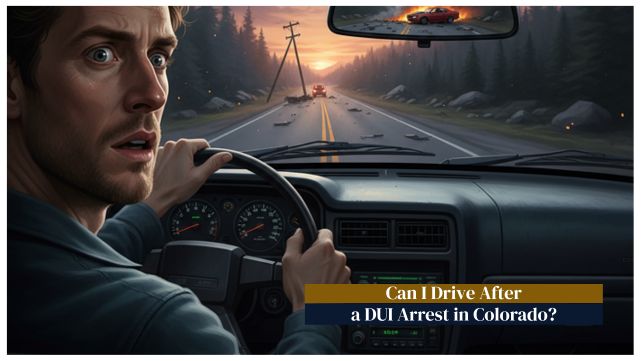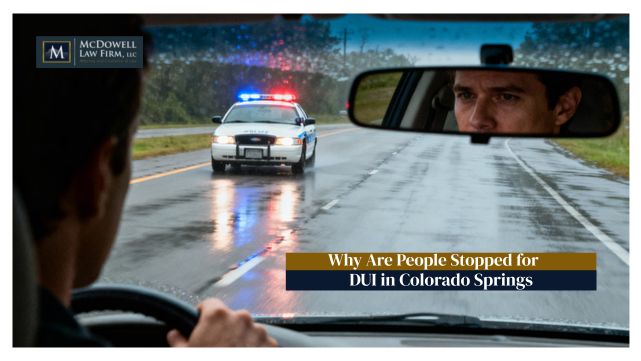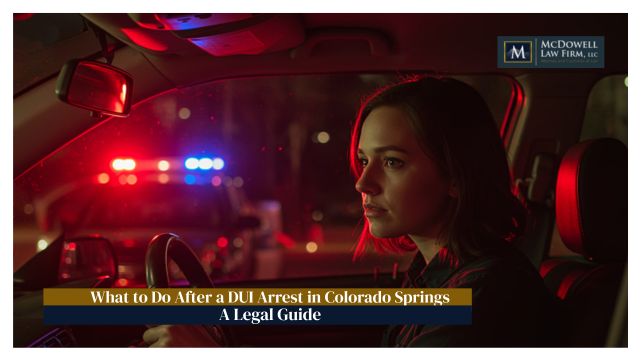You got arrested for DUI in Colorado. Now you have one urgent question: Can I still drive?
Losing your ability to drive means losing your independence, your job, and your livelihood. The answer depends on what happened during your arrest, what test you took or refused, and whether you act quickly to protect your license.
Here’s what you need to know about driving after a DUI arrest in Colorado.
Colorado’s Express Consent Law
Colorado is an express consent state. By driving on Colorado roads, you already agreed to submit to a chemical test if an officer has probable cause to believe you are under the influence. That test may be a breath test at the station or a blood draw.
When you are arrested for DUI, the officer will confiscate your physical driver’s license. They will issue you a Notice of Express Consent Affidavit and Notice of Revocation. This paper is your temporary license. It allows you to continue driving legally for seven days, unless you request a hearing.
The 7-Day DMV Hearing Deadline
You have only 7 days from your arrest date to request a Division of Motor Vehicles (DMV) hearing. This applies if you took a breath test or refused testing.
- If you do not request the hearing within that timeframe, your license will be automatically revoked
- If you request the hearing on time, the DMV will issue a new temporary license valid until your hearing date
This gives you additional time to drive legally.
For blood test cases, the process differs. Your license is not immediately revoked. You will be notified later by mail if your results show an unlawful blood alcohol concentration (BAC). You then have a short window to request a hearing.
Driving While Your Case is Pending
You can continue to drive legally in Colorado as long as you have your temporary license from the express consent affidavit. You must also properly request your DMV hearing if required. You can drive until your hearing is held.
At the hearing, the DMV will decide whether to revoke your license. This hearing is separate from your criminal case. It focuses only on whether your license should be suspended.
License Revocation Periods
If the DMV finds against you, your driving privileges can be revoked:
- First offense (BAC .08 or more): 9-month revocation
- Refusal: 1-year revocation
- Second or subsequent DUI: longer revocation periods, often up to 2 years
Early Reinstatement and Driving Privileges
Even if your license is revoked, Colorado law allows many drivers to apply for early reinstatement with conditions. To qualify:
- You must not have refused chemical testing
- You must install an ignition interlock device on your vehicle
- You must obtain SR-22 insurance (special high-risk insurance filing)
- You must pay reinstatement fees to the DMV
Ignition Interlock Requirements
- The ignition interlock device is a breathalyzer installed in your car. It requires a clean breath sample before starting.
- First offense DUI (BAC between .08 and .149): You may reinstate early after 30 days with interlock for at least 8 months
- High BAC (0.15 or greater): Designated as a “persistent drunk driver,” requiring 2 years of interlock and mandatory alcohol education/treatment
- Second offense DUI: 2 years of interlock minimum
- Refusals: Not eligible for early reinstatement; must serve full 1-year revocation before applying for interlock reinstatement
Why Acting Quickly Matters
Can you drive after a DUI before court date? Many drivers wait to “see what happens” in their court case before addressing their license. This is a mistake.
The DMV process runs on its own timeline. It does not wait for your court case to resolve. Court and the DMV are independent actions. You could win one and lose the other on the exact same facts. They have different standards of proof.
Court is “beyond a reasonable doubt.” At the DMV hearing, the standard is “preponderance of the evidence.”
Failing to request a DMV hearing within the 7-day deadline means automatic license revocation. This happens no matter what happens in court. By acting quickly, you preserve your driving privileges while your case works through the system.
Common Questions About Driving After a DUI Arrest
1. Can I drive the morning after a DUI arrest?
Yes, if you still have the temporary license (express consent affidavit) and your 7 days have not expired, or if you requested a DMV hearing.
2. If I refused the test, can I drive?
Only until the 7-day window expires, unless you requested the hearing. After that, your license is revoked for one year. You are eligible for early reinstatement after 2 months. You will have conditions to reinstate (SR-22, alcohol treatment, fees), and you must maintain an Interlock device for two years.
3. What does the 1-year revocation mean if I can get my license back after 2 months?
You will be issued a restricted license if you do early reinstatement. You have to carry the Interlock for 2 whole years either way. Whether you do early reinstatement or wait, you still have to carry the Interlock for two years. In practice, it doesn’t mean much. Be thankful that they have the early reinstatement option.
4. If I win my DMV hearing, do I keep my license?
Yes. If the DMV hearing officer rules in your favor, you keep your driving privileges unless you receive penalties in the criminal case that later imposes its own suspension. There are two ways to lose your license: DMV administrative hearing or the criminal case.
Can You Drive After Getting a DUI: Your Next Steps
After a DUI arrest in Colorado, you can still drive legally. This only works for a limited time and only if you act quickly. The key steps are:
- Understand that your Notice of Express Consent Affidavit is your temporary license
- Request a DMV hearing within 7 days if you took a breath test (.08 or greater for adults) or refused testing
- With a blood test, the 7-day window does not apply, as the blood test will take months to come back. The DMV will only file on you if your result was .08 or greater within 2 hours of the time of driving
- Consider your eligibility for early reinstatement with ignition interlock and SR-22 insurance if your license is revoked
Why You Need a DUI Attorney
The rules around DMV hearings, reinstatement, and interlock periods are complicated. They vary depending on your case. An experienced Colorado Springs DUI lawyer can represent you at the DMV hearing, challenge the evidence against you, and guide you through reinstatement so you can get back on the road as soon as possible.
Don’t let confusion about the DMV process cost you your driving privileges. Contact our office today to discuss your case and protect your license. McDowell Law Firm (719) 227-0022





